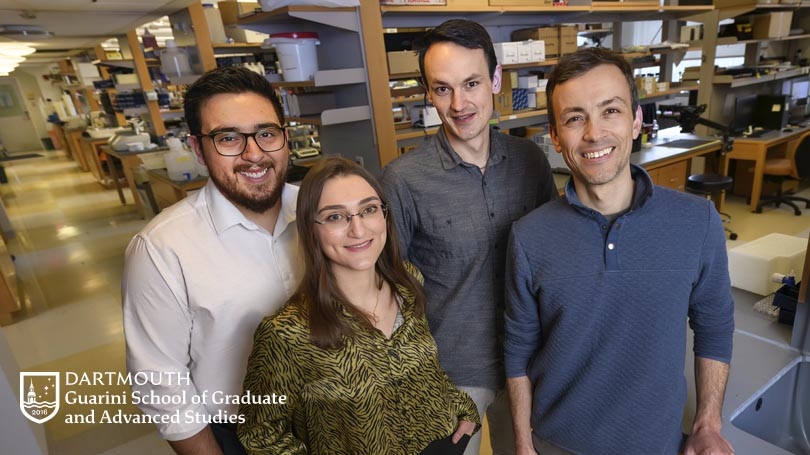
Members of the Hill lab: Genaro Olveda, Xhoela Bame, Tim Chapman, and Professor Robert Hill.
(Photo cred: Perry Smith)
Two graduate students in Robert Hill's research group have been awarded prestigious predoctoral fellowships, and, with a third, have co-authored an article recently published in Nature Neuroscience.
An assistant professor in the biological sciences department at Dartmouth, Hill leads a lab that lab studies interactions between neurons and glia in the brain in an effort to better understand how cells behave. One focus of the lab is on a process called demyelination, a type of cell degeneration that makes it difficult for aging or diseased brains to function well. The research team is trying to figure out how the damage happens, and what is required to make repairs.
"You can think about myelin as insulation on a wire," says Hill. "It's really important for modulating and helping speed up the propagation of signals, affecting how different cells are communicating from one part of the brain to the other."
But if myelin is damaged, either over time, or because of an ailment such as multiple sclerosis, demyelination occurs, and signals are no longer efficiently sent throughout the brain. Hill and his students are studying that process in mice.
Xhoela Bame, a PhD candidate in Dartmouth's Molecular and Cellular Biology Program who has received a predoctoral fellowship from the American Heart Association, says this is a promising area of research with real-world implications.
"In the Hill lab, we are using advanced in vivo imaging techniques to unravel the dynamics behind myelin generation and repair. Understanding how these processes occur has broad implications in brain development, neurodegenerative diseases, and aging," says Bame.
Born in Albania, Bame graduated from Istanbul Technical University in Turkey.
"I also did two internships through Erasmus Fellowships in Spain and Germany, where I could enhance my research and lab skills. At Dartmouth, I am fortunate to continue my advocacy efforts alongside research as a student representative in the Molecular and Cellular Biology Graduate Council and as Dartmouth representative in the New England Graduate Women in Science and Engineering alliance," she says.
"The Molecular and Cellular Biology program at Dartmouth was a perfect fit for my academic profile and research interests. The groups are small, and that allows for great mentorship. It's a very student-oriented program with a strong community that cares about your overall training."
In Hill's lab, Bame works alongside Genaro Olveda, who is pursuing his doctoral degree from Guarini's new Integrative Neuroscience Program. He received his predoctoral fellowship from the National Institutes of Health.
"I wanted to work with Robert because of the important line of questions he is asking, and the amazing technology he is using," says Olveda. "I really have a passion for in vivo imaging of a live animal and seeing what's really going on in time and not just taking one little snapshot of a piece of tissue."
Olveda, who is Mexican-American, was born and raised in Salinas, California, and earned his undergraduate degree in neuroscience from the University of Rochester." At Dartmouth, my knowledge is definitely being pushed to the limits," he says. "But I think that's what graduate school is all about, to know what your limit is and then to build from there to become an expert in the field. Graduate school can be pretty stressful and tough, but Dartmouth as a whole is a very supportive community."
Olveda is active in a campus chapter of Nerd Squad, which connects college students with young aspiring scientists. "Our goal is reach out to elementary schools and spread STEM awareness to the younger generation," he says. "We organize science nights in local schools, and try to serve as mentors."
Both Olveda and Bame have their own mentor in Hill's lab: Tim Chapman. A sixth-year PhD candidate in the Molecular and Cellular Biology Program, Chapman says Hill has been integral to his own progress as a scientist.
"You get as much help as you ask for without having him over your shoulder at all times, which is awesome in the beginning, because the techniques that we use are really complex," says Chapman. "There's a big learning curve. So having someone that you can actively go to and ask for help, any time, is really valuable. Then once you kind of get up to speed, he gives you the freedom to go off and do your own thing."
Chapman also values close collaboration with his lab-mates. With Hill as principal investigator, he, Bame and Olveda co-authored the Nature Neuroscience article, which establishes a new technique for studying demyelination and discovers new forms of repair by distinct subsets of brain cells.
Hill says he could not have reached these conclusions without the intensive involvement and cooperation of the students in his lab, who are helping him navigate unexplored territory.
"There's so little known about how the brain functions. And humans are living longer. So we need to better understand why our cells degenerate and how we can help slow that process. At least from my perspective, it's a new forefront in science."